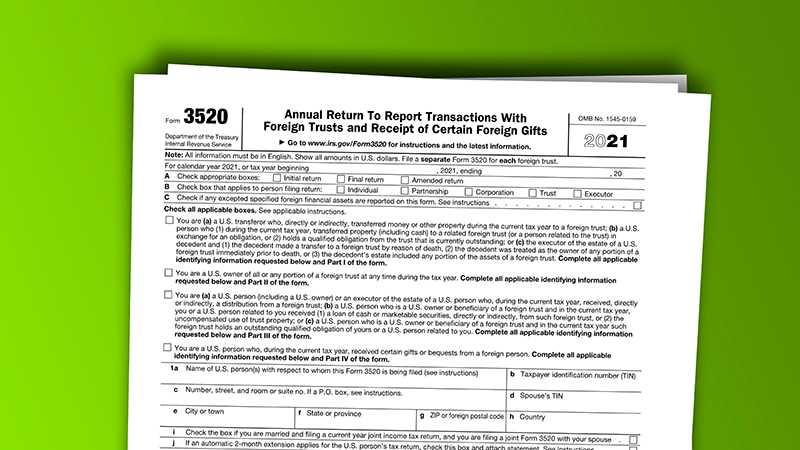The impact of penalties for not filing Form 3520 can be
Wiki Article
Exactly How Coverage Foreign Inheritance to IRS Functions: Key Insights and Standards for Tax Obligation Coverage
Navigating the complexities of reporting international inheritance to the IRS can be difficult. There specify thresholds and forms that individuals need to understand to guarantee compliance. As an example, inheritances surpassing $100,000 from non-resident aliens need particular focus. Failure to comply with these standards may lead to charges. Comprehending the subtleties of tax obligation ramifications and needed documents is vital. The following sections will certainly lay out vital understandings and standards for efficient tax coverage.Comprehending Foreign Inheritance and Its Tax Obligation Effects
When individuals obtain an inheritance from abroad, it is important for them to recognize the involved tax effects. In the United States, inherited assets are typically exempt to earnings tax obligation, but the estate where the inheritance comes may have particular tax responsibilities. Foreign inheritances can complicate issues, as various nations have varying policies regarding estate taxes. Individuals should know that while they may not owe tax obligations on the inheritance itself, they might be responsible for reporting the worth of the international property to the Irs (IRS) In addition, money exchange rates and assessment approaches can influence the reported well worth of the inheritance. Comprehending these elements is vital to stay clear of unexpected tax obligation liabilities. Looking for support from a tax obligation professional seasoned in global inheritance legislations can supply quality and warranty compliance with both united state and international tax obligation requirements.
Coverage Demands for Inherited Foreign Properties
The reporting requirements for acquired international possessions entail particular thresholds and limitations that taxpayers should comprehend. Conformity with IRS laws necessitates the ideal tax kinds and recognition of possible charges for failing to report. Recognizing these aspects is important for people receiving foreign inheritances to stay clear of lawful difficulties.Coverage Thresholds and Purviews
While traversing the intricacies of acquired foreign possessions, understanding the reporting thresholds and limits set by the IRS is crucial for compliance. The IRS requireds that united state taxpayers report international inheritances surpassing $100,000 from non-resident aliens or international estates. This restriction puts on the complete value of the inheritance, encompassing all properties obtained, such as cash, property, and financial investments. Additionally, any kind of international financial accounts totaling over $10,000 need to be reported on the Foreign Financial Institution Account Record (FBAR) Failure to stick to these limits can cause considerable charges. It is critical for taxpayers to properly examine the worth of inherited foreign properties to guarantee compliant and prompt reporting to the IRSTax Forms Review

Penalties for Non-Compliance
Failure to abide by reporting demands for inherited foreign properties can cause significant charges for U.S. taxpayers. The IRS imposes rigorous guidelines relating to the disclosure of international inheritances, and failures can bring about penalties that are usually considerable. For circumstances, taxpayers may encounter a charge of approximately $10,000 for stopping working to file Form 3520, which reports international presents and inheritances surpassing $100,000. Furthermore, continued non-compliance can escalate charges, possibly rising to 35% of the worth of the acquired asset. Moreover, failing to report can likewise activate much more serious effects, including criminal charges for willful neglect. Taxpayers must remain attentive to prevent these consequences by making certain precise and prompt coverage of international inheritances.Secret Kinds and Documentation Needed
When a private gets an international inheritance, it is vital to comprehend the crucial kinds and documents required for conformity with IRS laws. The key kind needed is the IRS Type 3520, which should be filed to report the invoice of the foreign inheritance. This kind provides comprehensive details about the inheritance, consisting of the identification of the foreign decedent and the value of the acquired properties.Furthermore, if the acquired residential property includes international savings account or various other economic properties, the individual might require to submit the Foreign Savings account Record (FBAR), FinCEN Type 114, if the total value surpasses $10,000. Correct paperwork, such as the will or estate records from the foreign territory, need to also be gathered to substantiate the inheritance insurance claim. Keeping extensive records of all transactions and interactions connected to the inheritance is important for accurate coverage and compliance with IRS needs.
Tax obligation Treaties and Their Influence On Inheritance Tax

Comprehending the effects of tax obligation treaties is essential for individuals obtaining foreign inheritances, as these agreements can significantly influence the tax obligations related to inherited possessions. foreign gift tax reporting requirements. Tax treaties between nations usually give specific standards on just how inheritances are strained, which can cause reduced tax obligation obligations or exemptions. As an example, a treaty might state that certain sorts of inheritances are exempt to tax obligation in the recipient's country, or it might enable credit scores against taxes paid abroad
Individuals have to familiarize themselves with the specific stipulations of pertinent treaties, as they can vary substantially. This knowledge aids ensure conformity with tax policies while optimizing possible advantages. Additionally, comprehending just how treaties engage with residential legislations is vital to properly report foreign inheritances to the IRS. Consulting with a tax expert well-versed in global tax obligation law might be a good idea to navigate these intricate regulations properly.
Typical Mistakes to Stay Clear Of When Reporting Inheritance
Many individuals believe they can quickly browse the complexities of reporting foreign inheritances, they commonly forget crucial information that can lead to considerable mistakes. One typical blunder is failing to report the inheritance in the proper tax obligation year, which can result in fines. Additionally, some individuals disregard to convert international properties into U.S. dollars at the proper currency exchange rate, subsequently misrepresenting their worth. One more frequent oversight entails misunderstanding the reporting thresholds; individuals may think they do not need to report if the inheritance is listed below a certain quantity, which is unreliable. Misclassifying the type of inheritance-- such as dealing with a present as an inheritance-- can complicate reporting responsibilities. Ultimately, individuals commonly fall short to keep thorough documents, which is vital for avoiding and verifying cases audits. Understanding of these challenges can substantially boost compliance and minimize the danger of monetary consequences.Seeking Expert Assistance for Complex Situations
Navigating the complexities of reporting international inheritances can be intimidating, especially for those with intricate monetary circumstances. People dealing with problems such as numerous international possessions, differing tax ramifications across territories, or intricate family members dynamics might take advantage of expert support. Tax specialists specializing in worldwide tax obligation law can supply vital insights right into the subtleties of IRS guidelines, guaranteeing compliance while minimizing potential obligations.Involving a cpa (CERTIFIED PUBLIC ACCOUNTANT) or tax attorney with experience in foreign inheritance can help clarify reporting requirements, recognize appropriate exceptions, and plan finest tax obligation approaches. They can assist in completing required types, such as Kind 3520, and handling any kind of added disclosure requirements.
Eventually, seeking professional support can ease tension and enhance understanding, penalties for not filing Form 3520 enabling individuals to focus on the emotional elements of inheritance rather than becoming overwhelmed by tax complexities. This proactive strategy can bring about more beneficial end results in the lengthy run.
Regularly Asked Inquiries
Do I Need to Report Foreign Inheritance if I'm Not an U.S. Citizen?
Non-U.S. people normally do not need to report foreign inheritances to the IRS unless they have certain links to united state tax obligation regulations. It's a good idea to speak with a tax obligation professional to make clear specific scenarios.Exist Fines for Failing to Report Foreign Inheritance?
Yes, there are charges for failing to report foreign inheritance. Individuals may face significant fines, and the IRS can impose added consequences for non-compliance, potentially impacting future tax obligation filings and economic standing.Can I Deduct Costs Connected To Managing Inherited Foreign Assets?
Expenditures related to handling acquired foreign assets are usually not deductible for tax obligation objectives. Nonetheless, individuals ought to consult a tax professional for advice tailored to their specific scenarios and prospective exceptions that may use.Exactly How Does Foreign Currency Impact the Worth of My Inheritance Record?
Foreign money changes can substantially influence the reported worth of an inheritance. When converting to U.S - reporting foreign inheritance to IRS. dollars, the currency exchange rate at the time of inheritance and reporting figures out the final reported value for tax obligation purposes
What Happens if My International Inheritance Is Held in a Trust?
It might complicate reporting needs if an international inheritance is held in a trust. The trust's structure and tax effects need to be analyzed, as beneficiaries might deal with differing tax obligation obligations based upon jurisdiction and trust type.The IRS mandates that U.S. taxpayers report foreign inheritances going beyond $100,000 from non-resident aliens or foreign estates. In addition, any type of foreign economic accounts completing over $10,000 should be reported on the Foreign Bank Account Record (FBAR) Individuals acquiring foreign properties must commonly report these on Form 8938 (Declaration of Specified Foreign Financial Properties), if the overall worth surpasses particular thresholds. Depending on the nature of the inheritance, various other kinds such as Type 3520 (Annual Return To Report Transactions With Foreign Trusts and Receipt of Certain International Gifts) may likewise be required. Additionally, if the inherited property consists of international bank accounts or other monetary assets, the individual may need to file the Foreign Bank Account Record (FBAR), FinCEN Kind 114, if the complete worth goes beyond $10,000.
Report this wiki page